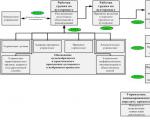03.12.2021
What should I do if I don’t want to study or work? Psychological and physical problems, ways to solve them
Have you ever woken up in the morning and just died from the thought of how many tasks you need to do? How many pages do you need to read? Most likely yes.
You sat down at your desk and didn’t want to do literally anything. Believe me, everyone knows this. But there are small tricks in approaching the learning process, using which you can increase your productivity and increase motivation.
1. Work for the future
Think about why you are studying now? Maybe you have educational institution dreams - college or university. By completing regular homework, you are one step closer to your goal.
It’s trite but true: a journey of a thousand miles begins with the first step :)
Knowledge - school or university - will be useful to you in later life. Not all, of course, but without specialized skills you will not get into large or foreign universities. And who knows what heights you can achieve by working hard?
2. Look for inspiration
There are thousands of accounts whose main content is educational. If you click on the hashtag on Instagram #studyblr (study + tumblr), then a world of books, inspiration and aesthetic notes opens up. Here people share their love for the learning process. After looking through a couple of such publications, you can get in the perfect mood for work.
What should we do if a child who has reached secondary school, hereinafter referred to as a teenager, suddenly begins to demonstrate complete incompatibility with this school and ignores all our pedagogical attempts or is met with hostility? Is it possible to somehow return decent grades to his diary, and the desire to study for him? Where did the obedient and quite diligent child go? What's happening?
In principle, we are all well-read parents today. We know that adolescence is a difficult time in a child’s life, that we need to allow him to be independent, choose his own friends, decide for himself what to eat for lunch, what to wear, what to watch... “Yes, let him wear whatever he wants and even eat nothing at all,” explodes Anna, the mother of 13-year-old Gleb, “but I won’t allow him to abandon school! After all, I’ve completely lost my fear, I’m a fool...”. Gleb became a blockhead not so long ago, just a year ago, when he entered the sixth grade. Before that, he was considered a normal schoolboy, he studied with straight A’s and B’s, and his parents were sure: the closer to high school, the fewer problems there should be. After all, so much effort is invested, and school is expensive, and the motivation of a growing person should grow!
However, in reality this is what happened: from the very first months of the school year, Gleb picked up C grades, by the end of the six months he began to get D grades, and, despite the terrible scandals at home, control, notations and sanctions, it was not possible to pull the guy out of the swamp into which he had plunged. succeeded. The most offensive thing was for history and English - my previously favorite subjects.
At first, parental suggestions had a good effect on the teenager: he repented, sat down to his textbooks and studied diligently for several days. Then, as my mother says, “he became insolent.” The diary stopped being filled out (the teachers’ indignant entries don’t count), notebooks were “lost”, Homework day after day it “didn’t work out.” Anya was speechless with indignation, and Gleb sat at the computer with headphones on, playing an online game with friends and muttering: “We’re already fed up with our school...”. Over the summer, everyone took a break from school, and now seventh grade is starting, and mom is nervous in advance, dad is in a threatening mood, only the son is calm: “I’ll learn, don’t worry”.
Another family: 14-year-old Nastya, winner of various school competitions, beauty and excellent student - and again a similar story. The last two classes are like a dream. The child naturally does not understand that they go to school to study, and not to communicate with friends and not to hang around at rehearsals of the school ensemble. Evening calls to the home phone have long become a punishment for parents: the responsible class teacher regularly rings the alarm - let's save the best student! They replaced her, she has gone wild, she has only boys on her mind... Mom and Dad agree to save her, but how? How to force you to study?
No way. You won't force me. No recipes. All teenage psychologists say this in unison. Questions about studying at high school their parents torture them regularly. Because everyone has the same thing: until the 6th grade the child studied normally, and then he slipped... And mom and dad begin to experience psychosis: what will happen next? How are the graduating classes? The disappointment in the child is complete, the future brings melancholy.
And it would be completely bad if it weren’t for a strange coincidence: after all, it’s like this for everyone, not just us, why?
The teenager wants to study!
There is a myth that a teenager does not want to study. This is not true. A teenager absorbs information like a sponge, he learns and grows - but not in the subjects taught at school. However, now he is learning two extremely important sciences, perhaps the most important for a person: he is learning to understand himself and understand others. This is the main task of adolescence, and if mom and dad are not ready to admit it, things are bad. Because, as you know, you can’t go against nature, and nature has arranged everything in such a way that right now a person recognizes himself as an individual and masters ways of living in a group. How to behave in different situations, how to react to different people, how to gain sympathy, how to get out of conflict situations and build your self-esteem. As they say, feel the scale: the psychological foundation of your entire adult life - and three paragraphs on history...
Usually at this point parents object: three paragraphs of history will add up to the child’s professional future. Without today's paragraphs, you won't understand tomorrow's paragraphs, you'll miss the day after tomorrow - and goodbye to the Unified State Exam, and at the same time admission to a good university and brilliant career prospects. There is only one argument to this objection: imagine a house without a foundation. Can you live in it? School knowledge can be learned and systematized in the most beautiful way, however, the lessons of communication and self-realization that are not mastered in time will simply not allow this knowledge to work. Or at least they'll get in the way. Basics successful communication, self-confidence is what should be the most valuable result of this difficult period, high school.
What will it lead to?
Now we have the main thing: an understanding of why everything happens this way. You can already relax a little: your child has not become lazy or unruly, he has simply directed all his cognitive forces to another area - moreover, to the one in which nature programmed him. He's just acting normal for his age - isn't that great?
And then here's what. High school - important stage psychological preparation for high school. Successfully completed, this period of growing up will be a pass to older age. In high school, interest in the team decreases, interest in oneself as an independent person, in individuality, increases. A teenager already knows himself, is confident in his merits, evaluates himself adequately and can look into the future as an adult - assessing possible prospects, chances of success in this or that business. When you know yourself well, it’s easier to realize what you really want from life, it’s easier to turn it into a goal, build a plan to achieve it and, most importantly, find the resources to implement it. Motivation cannot be brought from the outside, it always comes only from within - if, of course, we are talking about the individual.
Most teenagers in high school, of their own free will, suddenly “come to their senses” and demonstrate interest in school subjects. Parents could relax here, but now they are worried that this interest is selective. Knowing where he will go and what to take, the high school student drops the “unnecessary” subjects. And by the way, from the point of view of simple logic, he is doing absolutely the right thing. The argument “you need to finish school normally” is not an argument for him. He saves energy - primarily intellectual. And he treats his head with respect: in general, there is no point in cluttering it with dead knowledge. It’s a pity that we, adults, usually only allow ourselves this privilege.
Other reasons
It is important to understand that this general, “general” reason why most children “sink” through high school may not be the only one. In any case, the child perceives this period as a difficult uphill climb, but it will be much more difficult if there are aggravating circumstances.
For example, severe overload. This is now a widespread cause of aversion to learning. IN elementary school the child obediently follows the ambitions of his father and mother, allowing himself to be loaded with additional activities to the limit and without even thinking about it. And in middle school, fatigue accumulates, and most importantly, the strength and courage to resist parents appears. There is only one piece of advice: remember common sense and balance your ambitions with the child’s strengths. He should have time to just run, play, lie on the couch, and think. Doing homework until one in the morning has no meaning other than a purely formal one.
Another reason is disappointment in teachers. Again, by this age, the child has already taken off his rose-colored children's glasses and sees us, adults, in all our unsightly glory. A person of 12-13 years old is no longer able to feel the authority of a teacher only because of his professional affiliation. If some subjects in your class are boring, get ready for the fact that these are the subjects your child will dislike. And the general style of presenting information in our schools for the most part leaves much to be desired. The broadcasting and edifying position of teachers still finds a response in the lower grades, when the leading activity of children is academic. But at 5-6, children are already different, but teachers are not. Boring is not the right word. Boring is when there are one, two, three, or ten boring lessons. Now imagine several years in such an atmosphere - do you want to study? In general, do not attribute the teacher’s lack of talent to the child’s laziness. If you are not ready to change schools, get interested in this subject yourself, buy additional literature, organize excursions to thematic places - everything is in your hands. Your child's interest is on your side. practical activities- now it’s like air for him. Don’t sit, listen, record and play, but move, search, produce something interesting yourself.
The third reason is the most difficult. Because it concerns family relationships. It is an exceptional case when, in an atmosphere of scandal and dislike, a child learns normally. Basically, the most difficult difficulties of the transition period are associated with the fact that the teenager actually does not have a family. There is no friendship, understanding, trust - in such conditions anyone will lose interest in learning. Sometimes parents are sure that there is no connection between their small quarrels and their son’s threesomes. This can only be verified by establishing relationships with each other. By the way, very often a psychologist who is approached with a request regarding a child’s poor academic performance is forced to first solve family-wide problems, because the root lies precisely in them. And sometimes good grades return as if by magic, although no special effort was made for this.
In any case, if a child’s grades, as they say, “out of the blue,” have deteriorated significantly, it is necessary to understand the reasons. It is best to do this with a psychologist - for the first time, even the presence of your teenager may not be necessary.
Important age
The main advice that can be given to parents at this moment: be there and help quench the child’s age-related thirst for self-knowledge and communication with peers. Until it is satisfied, he really has no time for studying. What will help here? Books about modern teenagers who speak the same language as him and about things that interest him. Stories about our own teenage years - about how strange and stupid we felt at their age, what stories happened to us, how we reacted to them, how we felt. To the best of your ability, participate in building relationships with peers - do not interfere with communication, do not forbid seeing each other and corresponding, and most importantly, do not denigrate your teenager’s friends, because now he identifies himself not with you, but with his peers, so everything that is against friends is about his own self-esteem. You also need to communicate on the Internet! Sit at the computer for a couple of evenings, help find resources where there is useful communication, where things that are important for teenagers are discussed. Invite his friends home, and it will be great if you help the whole group get excited about something positive. Offer them a useful unifying principle - even making soap (here is chemistry in its most interesting, practical aspect). Remember, a teenager loves to learn! But something really interesting and of course - in the company.
Blog of Lyudmila Petranovskaya
, a famous Moscow psychologist. Lyudmila has been working with foster families for many years, but her advice is always relevant for parents of completely “self-made” children. After all, accepting your own teenager is no easier than accepting a completely stranger’s adopted one. If your child’s reluctance to learn manifests itself against the general background of “difficult” behavior, read
Petranovskaya’s book “How are you behaving?”. It contains a lot of wise and effective advice.
« Survival Course for Teens" Written in the late 1980s and instantly becoming a cult classic, the book still reads like a bestseller. The author, popular American rock musician Dee Snider, has an honest conversation with teenagers about everything that worries them. The book is written with humor and a lot of examples from my own life. In addition, Snyder’s friend, a teenage psychologist, also had a hand in it, so all the advice given in the book is quite professional.
Natalya Rodikova (Natinka)
for the magazine " Expensive pleasure»
Plaintively and pleadingly: “We have a good boy, but we don’t know how to make him study...”. Desperately: “My son is 17, he dropped out of school, he doesn’t want anything, help!” Panic: “When my son says that he won’t go to school today, everything inside me turns cold and I start to feel sick. I'm terrified." And it’s absolutely wild: “Katerina, here is a list of requests from teachers for your webinar: “How to make children interested in a subject that they will not take? How to motivate teenagers to study when they don’t need anything? How can we instill in children that a lot depends on their studies?” And again and again: “How to get children to do something that is not interesting to them, is not necessary, is taught boringly and is associated with continuous humiliation?”
Well, I know a couple of ways, take your pick.
If it's "cheap and cheerful"
then everything is very simple: you need to intimidate. It is advisable to start from early childhood: humiliate him, constantly compare him not in his favor, punish him for the slightest mistake, constantly remind him that his opinion is not interesting to anyone here, and in case of failure to complete his lessons, predict a career as a janitor. Why am I telling you, you know all this very well yourself! This is something that still wakes you up in the middle of the night in a cold sweat. However, your nightmares do not always save your children from such “motivation”.
Ruzanna, young, beautiful woman, cries at the reception: “I understand everything! That it’s impossible to do this with children, that, most likely, I’m hurting him, but I can’t help it. Every evening I sit down with him to do homework, and I bring myself and him to tears, to sobs. I'm so scared! He is only 7 years old, he is small! And the teacher says that you don’t have to do your homework. But as soon as I see the diary, and in it there is an entry in red “No homework!”, I immediately hear my mother’s voice: “Bring the belt!”, and that’s all... I don’t remember anything, nothing from school, not what we went through, not my friends, only the screams of the teacher and this is my mother’s, about the belt.” Ruzanna was never able to get a higher education; before exams she was overcome with such panic that sometimes she had to call an ambulance; she works as a manicurist. But there was definitely no need to motivate her!
And now about the expensive and time-consuming method.
First, you will have to deal with your own anxiety and guilt. Ideally, this should be done before children are born, but I understand that we live in the real world, not on a cloud, so we will assume that we already have a “difficult” teenager. However, it is not too late now. Let's start with a simple question: “What do you see as your parental duty?” So that the child has everything? A full box of pleasant, kind, joyful childhood memories that you never had? Stop.
You know, for some reason, people who had a truly happy childhood - calm, without dramas and serious injuries, sane and passionate family members - these people usually are not very zealous about how to satisfy all the desires of the child.
They have confidence that this rather unpretentious life with a minimum of entertainment and gifts is good. Well, you know, when people go to the theater a couple of times a season, they buy clothes when they are out of use (and not out of fashion!) and old ones, and everyone is busy with study and work. And not because “there’s no escape” or it will bring some incredible dividends in the future, but because it’s interesting and great to learn new things, strain your strength, and benefit people.
It looks like this is where the main fork is. Have you asked how to motivate?
You see, what’s the matter - when a child is really interested, not only does he need to be motivated, he has to be pulled away from the subject of the lesson.
My parents hid books from me. I literally have to lock the guitar away from my youngest daughter; it’s a pity that you can’t lock the piano. And if you take away all the pencils, markers and pens, she will draw on the foggy window glass. Because it is hardwired into the very first, deepest layer of the human psyche: the desire to create.
What do we see in modern school?
Sit, be silent, don’t open your mouth until you are asked. A set of random information divorced from life (both internal and external) that must be remembered, without understanding, and given back like vomit.
They (this knowledge) are not literally acquired, and cannot be acquired, because there is no request and no digestible form.
Well, as if you offered an infant to eat young shoots of gorse on the grounds that lambs chew - and that’s normal. Conclusion: if you haven’t found a teacher who can make you fall in love with your subject, look for enthusiasts outside the school walls. It's rare, but they do happen. Well, or harness yourself. I know one father with many children who carved out money from the considerable family budget for his eight-year-old daughter’s trip to France, “so that Anka would understand that the French language does not exist only to torment little girls with it.”
I hear objections - you won’t be interested in all subjects! There won’t be enough teachers with a capital “U”, or enthusiasm, or money. Agree! But honestly, why do you need your child to be an excellent student?
And if he doesn’t want anything, well, from the word “at all”? If all his interests are in the virtual world of games and social networks? And look how these children live. They are almost never alone, they have no everyday problems, and no skills either, all their needs are fulfilled right there, instantly, you don’t even have to ask loudly, just a hint.
“Sometimes I don’t even have time to finish my sentence. I’ll start something like “But there’s such a camp...” - and that’s it, they’ve already taken off, as if on cue, running to scour the Internet, look for the best, choose, buy. And they beam: really, we’re great? Are you happy? No, damn it, I'm not happy! I wanted to TALK about what kind of camps there are, what’s good about them, what should I choose... And I wasn’t going to go anywhere this year! Or rather, I was going, but with a friend, and he goes to cheap ones, from social security, but who will let me go there... So I stopped stuttering about anything at all, well, they are more expensive for themselves. Besides, they buy me things, but I still can’t use them, it’s dangerous.” This is one of my 15-year-old clients about his parents. They brought him with the same complaint: he doesn’t want anything, and it’s time to choose a profile and specialty.
This seems to be the root of the problem.
Anxiety and guilt make parents rush to fulfill their children’s wishes, without even asking what exactly the child wants right now.
We, former Soviet pioneers, always feel like we haven’t given our child something, he should be happy, right? Why is he sad, or irritated, or frowning and not talking? As if a person does not have the right to be UNHAPPY. I ask these hyper-responsible people: how are you? Are you always cheerful and happy with everything? No, they answer, of course not, there are things to do, worries, sometimes in the evening you can’t feel your feet, what happiness is there? “When do you feel good?” I continue the conversation. The answers are, in general, predictable: when you don’t need to do anything, but the children are under control. That is, when it’s my fault (“Did you do your homework? Did you wash the dishes? Did you sew on a collar for tomorrow?” - my mother’s voice behind me, and you cower all over, and quickly babble “Yes, mommy!”, just to avoid getting hit) calmed by fatigue, and anxiety calmed by the visual presence: everyone is at home, safe.
I would like to draw your special attention to the fact that usually the question “how to motivate” is asked by energetic and restless mothers regarding their lethargic, apathetic, and switched-off sons. It’s just that these mothers are trying to give their sons what they themselves needed during a difficult time of growing up: support and resource. Forgetting that boys need something completely different: challenge and reward for victory. Next time I will write in detail how to treat boys and girls separately. For now, I will say that a growing man needs faith in his strength and admiration. Mothers sincerely think that they are helping their son do right choice, when they bring him ready-made printouts with ratings of five universities, and he sees and hears “You’re still stupid, mom will decide everything herself.”
We do not have the calm, serene, attentive gaze of an observer-researcher: what kind of person is my child? What is his character? What is he passionate about? Who does he choose as his friends and why? Last summer he got up and went to bed with books about insects, spent days on the dacha pond, was ready to talk for hours about rare species of butterflies, but this year he doesn’t even remember them - why? Why did my daughter see herself as an interior designer for five years in a row and suddenly announced that she wanted to switch to an economic profile? All these questions can be asked with an anxious-hysterical intonation, or with benevolent curiosity. As if you were asking an unfamiliar but nice guest from afar: “How do you sow rutabaga there, with or without peel?”
So, having collected information about this stranger, it will be possible to offer him some kind of diet of activities more suitable to his habits and inclinations. Not forgetting that these inclinations and habits can be described descriptively and narratively, or evaluatively and categorically.
Compare.
“Our son, in general, is a friendly and caring boy, he has a lot of ideas, he easily finds contact with anyone, and never refuses to help. Most of all, he is interested in people and the relationships between them, he is also very passionate about competitions, his eyes are burning and his mouth is from ear to ear. It lights up easily, but if something doesn’t work out right away, it can give up what it started. He loves to make things with his hands; they are precisely in place. He will make an excellent teacher or counselor, or some kind of instigator of projects, I don’t know, start-ups or something.”
“Sloppy slob. Hysterical. Nothing gets done. All he has in his head is partying with girls, the slightest difficulty - and he runs away. I just said hello to a person, and I’m already his best friend, with no control at all in my head. He loses everything, forgets everything, grabs onto everything, and then gives it up halfway. I don’t know what can grow out of him, a courier, at best.”
This is about the same person, as you understand. But you want to be friends, work, do business with the person from the first picture, but not the person from the second. You see how complex this topic is - motivation. You can't get there on a crooked goat. Therefore, I will say this: the next time your precious child gets a bad grade from school, and you again decide that “you need to do something,” think about what result you want to achieve. Be honest about what need you are currently trying to satisfy. And realize that the child is a different person. It should get easier.
When republishing materials from the Matrony.ru website, a direct active link to the source text of the material is required.
Since you are here...
...we have a small request. The Matrona portal is actively developing, our audience is growing, but we do not have enough funds for the editorial office. Many topics that we would like to raise and that are of interest to you, our readers, remain uncovered due to financial restrictions. Unlike many media outlets, we deliberately do not make a paid subscription, because we want our materials to be available to everyone.
Hello reader! I think that every student will agree with me if I confidently state that thoughts like: “I don’t want to study at a university: what should I do?” visit quite often, especially during the session. Of course, someone may say that this is a fundamentally wrong approach to studying and complete irresponsibility, but every student has the right to the blues, and not necessarily from a higher educational institution.
Any student has the right to be “slack,” but you shouldn’t dwell on such decadent thoughts for too long, otherwise they will become an obsession.
If you, the reader, paid attention to this publication, then this means that all is not lost, and the desire to return to the goal of becoming a certified specialist is still present, albeit remotely.
So why not look for a way out of this situation together, because, as you know: “One head is good, but two are much better.”
Causes of apathy towards learning
Before taking any drastic action in your future student life, it is important to understand the cause of such depression. It is possible that, having found "root of evil", your mood will noticeably improve, and the desire to continue your studies will return again and will not leave for a long time.
From my own experience, I will say that I had such blues in every course, and each time the reason was the most unexpected. Having systematized my memories and studied the stories of familiar students, I can safely talk about the reasons for my reluctance to continue my studies. As a rule, they are trivial and do not require deep philosophical knowledge.
1. Broken heart.
For the most part, student love is an integral component educational process, it’s not for nothing that they say that university stands for “to get married successfully” (and this truth also applies to men). So this is why young people meet, communicate, start touching romantic relationships and cannot imagine their future life without each other, build joint plans for the future. When these plans are dashed by everyday life, separation from your significant other ends not only in the desire to leave university, but also in the unwillingness to live.
2. A feeling of extreme injustice.
Many modern students do not perceive the leadership of the teacher, trying in all lectures and practical exercises prove you are right. However, sometimes “teachers,” being tough nuts, know how to put an upstart and an insolent person in their place, and they do it publicly. Such a blow to self-esteem provokes depression and blues, and the desire to study further disappears altogether.
3. Financial stability.
Today, many students skillfully combine work and study, and when the latter brings stability and financial independence, the meaning of the precious “crust” is completely lost. Another question arises: “Why do I need this study when I already know my future specialty and have a specific workplace»?
4. Session.
Before taking exams, the increased mental load takes all the energy, and the student, looking at the mountains of reference literature, only has the desire to sleep it off and never go to university again. As a rule, this is a temporary phenomenon, and after passing the exam it seems that you are ready to move mountains. Such depression occurs more often just before and during the winter session, since in this “cold time” of the year the “hormone of happiness” is predominant in deficiency.
5. Mediocre studies.
If a student does not enjoy the educational process, and goes to university only for the sake of “crust” and the peace of mind of his parents, then the desire to quit studying visits him almost every morning, when the alarm clock forces him to get out of bed and interrupts his sweet sleep.
So now it is quite obvious what motivates a student when he unexpectedly loses the meaning of his future studies. If it is temporary, then there is no cause for concern; but when such “suicidal thoughts” occur almost every day, I become alarmed and reconsider my usual student life.
The power of motivation
Each student can independently get out of this feeling of apathy, or take timely help from family and friends. For example, a warm conversation among friends helped me, but for some, a good night’s sleep and a change of scenery are more suitable. Whatever a student does or undertakes, he should not quit his studies.
This is where we need to remember the motivation that brought him to these university walls a few years ago. It is important to refresh your memory of the values that were put into your head upon admission, as well as the goals that were set in your first year.
Is it really possible that primitive blues can disrupt the usual routine of life and cross out all future careers and prospects?
How to bring back your love for learning?
I often asked myself this question, but I realized that giving advice to someone is stupid, because every student chooses for himself the way to overcome his depression. A person is, first of all, an individual, therefore, what works for some does not help others.
But I still decided to push students who were lost in themselves onto a certain path of truth, and give them a unique opportunity to still get a diploma higher education. So, reader, do not ignore these tips.
1. If a student feels that his head is boiling with new knowledge acquired in unlimited quantities, it's time to tell yourself "stop", until the allergy appeared while studying. It is recommended to take a break, relax, and then plunge into the world of science and reference literature with new strength and a fresh head. Such short breaks allow you to forget about studying for a while, which means they won’t one day cause apathy or even a feeling of deep disgust towards it.
2. When you feel “sweet” from studying, it’s time change the situation, and spend the weekend not with notes, but with friends or in nature, for example. Such changes in the usual routine allow you to take your mind off the walls of the university and dull objects, but the memories of a pleasant time spent will then inspire the most unexpected actions for a long time. Among them, the desire to receive a honors diploma or pass the exam only with excellent grades.
3. Set yourself a new goal. This is necessary so that studying does not cause boredom, but, on the contrary, is a “stimulator” of excitement and the desire to learn something new. So why not invite the teacher to organize another science project to show off yourself and not die of boredom?
Such salvation from the blues helps excellent students gain new incentive, but mediocre students, on the contrary, can lead to a feeling of deep depression and noticeably worsen their academic performance. So it is recommended to use this method only if you are confident in your mental abilities.
4. Strange as it may seem, what helps many students regain their desire to learn is Love. Indeed, this bright feeling inspires and inspires deeds, so you will immediately want to live, create and gain new knowledge in your specialty. So why not combine business with pleasure, especially since you have very little time left to study - a maximum of five years.
5. You can always change your choice. If a student suddenly realized that he had chosen the wrong specialty, then there is no need to torment himself with meaningless lectures and knowledge that in life will only bring melancholy and complete disappointment.
You need to understand yourself, and then take a fateful step in favor of future self-realization and change the mistakenly chosen specialty. Don’t think that this is impossible, because real miracles can happen in universities, you just need to go to the dean’s office and find the main wizard.
So now it is obvious that everything is not as bad as it might seem at first glance. The main thing is to find a way out for yourself that will allow you to remember why this long journey of five (maximum six) years was started.
If one fine day you have lost the desire to study at a university, then you should not “judge yourself”, but first, it is advisable to understand yourself. To do this, go on sick leave, get some sleep and change your surroundings, clearing your thoughts. Decisions should only be made consciously and with a clear mind, since a moment of weakness can become a fatal mistake in fate.
In addition, it would not hurt to consult with older comrades who have experienced such a depressive situation more than once during the educational process. Perhaps not everything is so bad, and the experience of “experienced” people will definitely help you get back on track.
You can also discuss your problem with your curator, since it is this person who cares about your fate.
As a rule, competent teachers not only perfectly read their subject, but are also subtle psychologists. This is exactly what you should take advantage of, the main thing is to choose a convenient time for conversation.
And the last thing: it won’t hurt to check with your caring parents about your blues; perhaps they will give practical advice and help you find a way out of this unpleasant situation. If the thought is: “I don’t want to study: what should I do?” does not leave, it is possible that it is time to change something in your life.
However, before taking radical measures, you should pay attention to all the recommendations suggested above and, for your peace of mind, try them out in practice.
What if it helps?
But on the other hand: isn’t it time to think about the meaning of life, maybe these are all signs of fate? Or maybe radical changes are coming in your life? And, nevertheless, my advice: “You shouldn’t become a fatalist, and under no circumstances should you give up your studies.”
Conclusion: As part of this article, you learned about what to do if you don’t want to study at university. We wish you to stop moping, pull yourself together and move forward to new successes and victories!
P.S. How do you cope with the fact that sometimes you don’t feel like studying? Share your secrets.
P.P.S. Happy Student's Day, dear reader, because today is January 25th! (the article was published on January 25, 2014)
When sending their inquisitive children to school, many parents do not even suspect what difficulties they will have to face in the near future. Pedagogical practice recent years shows that the number of children who are not interested in learning is growing rapidly from year to year.
What to do if you are still in elementary school? Even experts are not always able to help solve this problem, but we will still try to understand the reasons for this situation.
Is there a problem?
It should be noted that every child is naturally endowed with such qualities as curiosity and the desire for knowledge. However, the modern education system is far from perfect. Teachers and parents are interested in obedient children who do not express their own opinions and absorb new material in unimaginable quantities. And the students, in turn, protest against such a system. It is quite natural that a child does not want to study. Advice from a psychologist will help relieve unnecessary tension and nervousness.
Remember yourself as a child. Did you really like all the subjects you studied and the features of teaching individual academic disciplines? But during this time the school curriculum has changed not for the better. Think carefully: perhaps the problem is not so serious and will resolve itself over time.

The question is blunt: why don’t children want to study?
The advice of a psychologist will give a positive result only if the reason for the child’s dislike of the learning process is promptly and correctly identified. There are several main factors that have a direct impact on a child’s attitude towards school activities. These include:
- lack of any interest in a significant part of school subjects;
- difficulties that arise when a child communicates with peers (classmates);
- negative emotions associated with the need to adhere to a strict regime - getting up early in the morning, sitting at a desk for many hours, doing homework every day;
- problems with mastering a specific school subject;
- with one of the teachers;
- loss of motivation.

Lack of incentives
It is not difficult to understand a child who refuses to study. Classes at school turn out to be not as interesting and enjoyable as parents described them. The first enthusiastic impressions quickly pass. What remains are routine classes, a fairly strict routine, and the fear of getting bad grades. Parents are perplexed: their child does not want to study.
The advice of a psychologist is primarily related to increasing motivation. This term is well known to adults, for whom the workplace is not only a source of income, but also an opportunity to achieve certain goals. At school, incentives are quite weak. Good grades in themselves, of course, are capable of bringing positive emotions. However, not all children are focused on long-term results, for example, graduating from school with honors or at least without C grades. Thus, a significant portion of students simply do not understand what daily classes are for.

At this stage, the influence of parents is of great importance, who must show their children verbally and by personal example how important school lessons are for their further development. Adults should try to convince little “rebels” of the need for success in school. As a comparison, we can cite any computer game in which the passage of the second, as well as all subsequent levels, depends on the results of mastering the first stage.
So, parents are faced with an unpleasant fact: their child does not want to study. The advice of a psychologist in such a situation will be very helpful.
Negative attitude towards learning: several minor reasons
In some cases, it is impossible to immediately determine what is causing the child’s dislike of learning at school. There may even be several reasons. To find out the whole truth, you should take a close look at your student. Sometimes dislike for activities can be caused by factors such as:
- excessive emotional and physical stress (numerous extracurricular activities, tense family relationships);
- the child’s hyper-responsibility, which does not allow him to relax, which as a result leads to a decrease in interest;
- change in learning conditions (moving to another class, changing the training schedule);
- systematic replacement of lessons with “foreign” teachers.

Building a relationship with a child: expert opinion
First of all, try to independently determine why your child does not want to study. The advice of an experienced psychologist boils down to the following:
- You should never put pressure on your baby. In families where children and parents have similar situations, they are resolved much faster and easier.
- Try to build your relationship with your baby on a different principle - to become a friend to him first and foremost. And only then play the role of a caring parent. For many members of the older generation, this seems unattainable. Some parents believe that children should never be spoken to as equals, since children should always remain children. If this doesn’t bother you, the results will be noticeable almost immediately. After all, the child will not hide anything from his best friend, and at any moment you will be aware of everything that worries him.
- Be sure to show your child that you love him in any way, even if he is not entirely successful. He should not feel that your attitude towards him may change because of such a fact as a dislike for studying.

Many schoolchildren who show interest in learning become completely uncontrollable when they enter the period. Parents are powerless in such situations, since it is difficult for them to establish contact with their noticeably older children. However, the problem is obvious: the child does not want to learn. What to do? Advice from a psychologist will help you cope with this situation.
Candidate of Medical Sciences Lyubov Samsonova, who deals with problems of endocrinology that arise in childhood and adolescence, believes that one of the reasons leading to the reluctance of schoolchildren to study is iodine deficiency. Deficiency of this substance affects the synthesis of thyroid hormones. This leads to memory impairment and absent-mindedness. Visual-figurative thinking suffers. It is especially difficult for those children who live far from the sea and consume minimum quantity iodine-containing products.

Note to parents: Please note that the daily iodine requirement for adolescent students is 200 mcg. It is recommended to give your child potassium iodide and also include iodized salt in his diet.
Practice trusting communication with your teenager and follow some general guidelines listed below.
Even if a child does not want to study, the advice of a psychologist will make life easier for all family members: they will relieve tension and stop arguing about the advisability of going to school. Below are some important points:
- Try to avoid comparisons that are painful for the child; do not cite the successes of his classmates or neighbor children as examples.
- Allow your son or daughter to decide for themselves in what order homework lessons should be done. At the same time, it is definitely worthwhile to unobtrusively prompt the child that first of all they should begin to master the most difficult material.
- Try to find compromises with your child: you can discuss in advance the optimal time for completing an extracurricular task and set aside a certain period for rest and all kinds of pleasant activities. Psychologists recommend refraining from setting strict time limits.

The best reward is parental approval
You should not give up if your child does not want to learn. The psychologist's advice to parents is, first of all, aimed at changing the reaction of adults to everything that happens to their children.
From the point of view of Candidate of Medical Sciences Anatoly Severny, who is the president of the Association of Child Psychiatrists and Psychologists, in the early school age It is very important for children to feel the support of their parents, to know that those closest to them are always on their side. At this stage, parental approval fades into the background, since at this stage there is a change in motivation (children strive to realize their own goals).
However, one should not think that parental support for a growing child is an empty phrase. Rather, on the contrary - parental understanding and approval can become decisive not only in solving school problems, but also in more difficult life situations.
Let's sum it up
Be sure to take an interest in the lives of your children, discuss the events of the past day with them every day, and do not hesitate to admit to them your mistakes and delusions. Studying in a modern school is a rather complex, but feasible process. Of course, parents should not do their child’s homework for them. But it is really necessary to understand the causes of temporary difficulties and help solve the problems that have arisen.

If, as a result of reflection, you still do not understand why the child does not want to study, the advice of a psychologist will help in clarifying the situation. And then your efforts will lead to the expected result. Love your children no matter what and trust them!
























